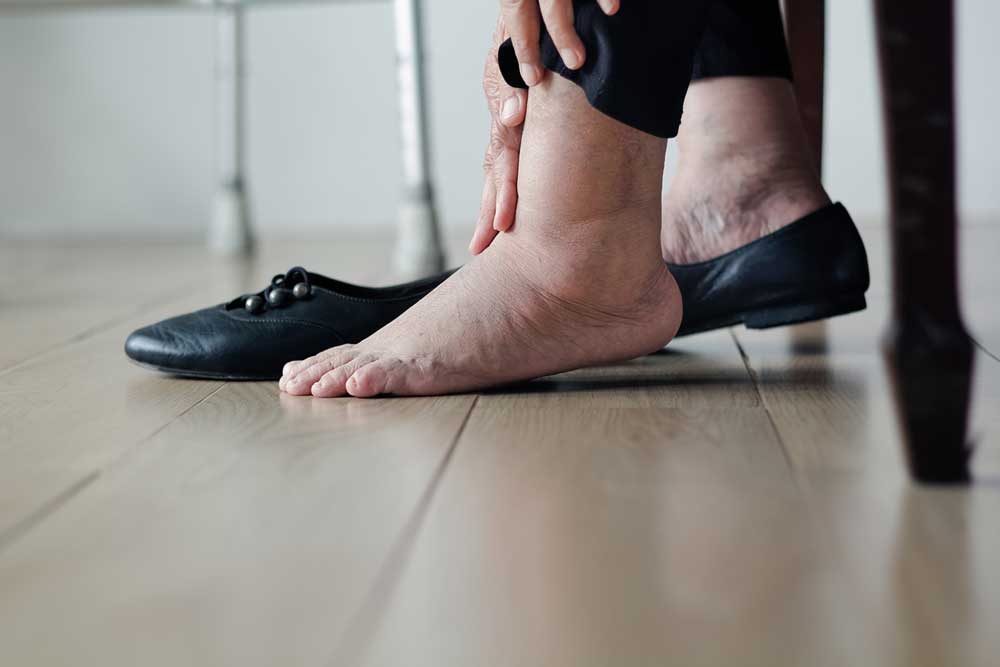Leg swelling can be a painful and scary experience. There are numerous potential causes of this condition from circulatory to environmental to inflammatory. In this article we discuss some of the most common causes of leg swelling, also known as peripheral edema.
Symptoms of Leg Edema
Leg edema is swelling of the legs due to accumulation of fluid in the tissues. The most common symptoms of edema are swelling, pain, warmth, redness, and a loss of mobility.
What Causes Leg Swelling?
There are many potential causes of leg swelling. Some are serious, and others are more easily treated. Some of the most common causes include:
- Infection: Infections can cause fluid to build up in the tissues around the legs, especially if the infection is severe. This can lead to leg swelling.
- Trauma: Trauma can cause damage to the blood vessels or lymph nodes in the legs, which can result in fluid accumulation and swelling.
- Nerve compression: Nerve compression, such as from a herniated disc or tumor, can block blood flow to the legs, causing them to swell.
- Neurological conditions: Conditions like MS or cerebral palsy can cause weakness or paralysis in one or more limbs, which can lead to leg edema.
- Overhydration: Drinking more water than your body needs can cause your body to retain water and increase the risk for leg swelling.
- Obesity: Being overweight may lead to a sedentary lifestyle. This reduced movement can make it more difficult to support healthy circulation and lead to increased fluid buildup.
- Acute renal failure: A decline in kidney function can lead to an increase in fluid retention and leg edema.
- Pain Relievers and Prescription Medicine: These medicines may have side effects that cause fluid retention.
- Congestive heart failure: Edema occurs due to increased fluid retention, which can be a sign of congestive heart failure.
- Diabetes mellitus: Diabetes is a leading cause of chronic leg swelling because it increases the risk for developing kidney damage and associated fluid retention.
- Cancer: Cancer patients may experience an increase in fluid retention due to medical treatments and/or side effects from cancer treatments.
- High blood pressure: Elevated blood pressure can contribute to an increase in leg swelling due to increased volume and weight gain in the legs.
Thrombosis and Leg Swelling
Thrombosis is a blood clot that forms in the veins. The most common type of thrombosis is a DVT, or deep vein thrombosis. DVTs can occur in any part of the body, but they are especially common in the legs. When a DVT forms, blood flow is restricted to the affected vein. This can cause the vein to swell and cause leg swelling. Other symptoms of DVT include chest pain, shortness of breath, and extreme fatigue. If you have any of these symptoms, please see your doctor.
Vasculitis and Leg Swelling
Leg swelling is a common symptom of vasculitis. Vasculitis is an inflammation of the vasculature, which is a network of blood vessels that supply the body with oxygen and nutrients. The most common type of vasculitis is called classical vasculitis, which occurs when the immune system attacks the blood vessels. This can cause leg swelling, pain, redness, and difficulty walking. Other types of vasculitis include focal nodular vasculitis and systemic lupus erythematosus. In both cases, the immune system attacks specific tissues in the body.
When to Seek Medical Treatment for Leg Swelling
If you have any of the following symptoms, you should seek medical attention:
- A sudden increase in leg swelling
- Leg pain that is not relieved by rest or compression
- Redness, warmth, or tenderness around the ankle or knee joints
- Difficulty moving your leg(s) or inability to move them at all
- Inability to bare weight on one or both legs
- Fever
- Black skin discoloration around ankle or knee
There are a few things that can happen if leg edema is left untreated. First, the swollen tissues may become infected. This can lead to sepsis (a life-threatening condition caused by infection). In addition, the excess fluid accumulation may cause pressure on veins and other vital organs in the leg, leading to leg pain, difficulty moving the leg, and even impaired blood flow.
If you or a loved one is suffering with leg swelling, contact us today to find out how we can help.









.jpg?width=944&name=Castle-Connolly-Top-Doctors-Emblem-Large%20(4).jpg)